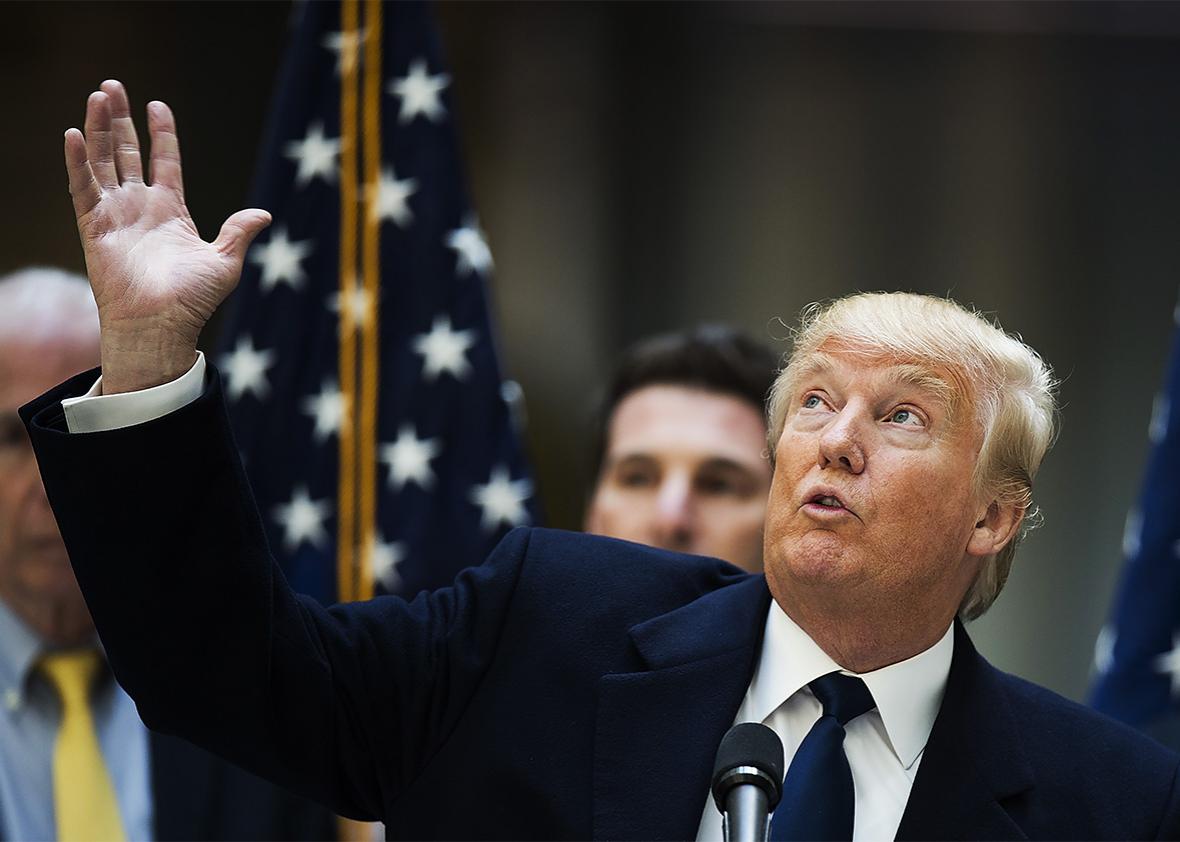Americans who read outlets like the New York Times woke up to detailed and largely accurate information about Tuesday’s attacks in Brussels, which killed and wounded dozens. Americans who watched cable news, on the other hand, woke up to Donald Trump, who presented these attacks—like the ones in Paris—as a boon for his campaign. “This is a subject that is very dear and near to my heart, because I’ve been talking about it much more than anybody else,” he said. “And it’s probably why I’m No. 1 in the polls. Because of the fact that I say we have to have strong borders. We have to be very vigilant and careful who we allow into our country.”
Meanwhile, some journalists were frustrated with the networks’ choice to give attention to Trump and essentially let him campaign on the destruction in Brussels before the bodies had even been counted. “ ‘Terrorist attacks help Trump’ isn’t a thing that just happens. It happens because after attacks, voters see his face on every TV network,” wrote Jill Filipovic, a columnist for the Guardian. “America may be one major terrorist attack from Donald Trump as president,” said Blake Hounshell, editorial director at Politico.
Both Trump and his critics are operating from the belief that terrorism, even abroad, helps the most reactionary and illiberal candidates in an election. Trump was the chief GOP beneficiary of the Paris attacks, which helped him build a larger lead over his rivals. In an apparently anti-establishment year, with many Americans driven variously by economic anxiety, racism, and deep fears of external threat, it’s easy to believe that Trump could ride the Brussels attack to more votes and a shorter path to the White House.
At the same time, there’s reason to think this just isn’t true. Americans do become more conservative in the face of physical threat. Fears over terrorism, for example, helped George W. Bush win a second term. But Bush was a sitting president who led the national response after the attacks on Sept. 11, 2001. For millions of Americans, he was a credible voice on the subject.
The same is not true of Donald Trump. As evidenced by his almost absurdist dialogue with the editorial board of the Washington Post, Trump doesn’t know anything about terrorism or national security. When asked about his proposed ban on Muslims, for example, Trump gave the Post’s Fred Hiatt a stream of words that carried no actual meaning: “Well look, there’s many exceptions. There’s many—everything, you’re going to go through a process. But we have to be very careful. And I was really referring in particular, you know, to migrations—Syrians, the whole migration, where we’re going to take in thousands. And I heard in the Democrat debate, I heard 55,000, okay. 55,000.”
He spoke this way throughout the interview, and in fact one thing we’ve learned from the constant coverage of the candidate is that he always speaks this way. The ignorance, demonstrated daily, even hourly, has had an effect among Americans writ large. According to the most recent Washington Post national poll, just 40 percent of Americans trust that Trump can handle terrorism better than Hillary Clinton. Just 37 percent say the same for immigration issues, and just 32 percent say the same for an international crisis. Indeed, as Nate Silver shows for FiveThirtyEight, not even GOP voters are thrilled with Trump’s ability to handle crisis, or even terrorism. And in a YouGov survey from earlier this month, 60 percent of Americans say that Trump is not ready to serve as “commander-in-chief.”
Republican voters didn’t flock to Trump after the Paris attacks because they trusted his leadership; they flocked to him because he leveraged the attacks into a larger anti-Muslim message that attracted the substantial portion of Republican primary voters with strong anti-Muslim views and deep concern over immigration.
It’s possible that this could carry over to a general election, as a foreign or domestic terror attack activates anti-Muslim attitudes among the general public. And it’s true that in the aftermath of the attacks in San Bernardino, California, Obama’s approval rating dipped, suggesting just that kind of response. But it’s also true that Obama’s approval quickly resumed its upward climb, as Americans moved on to other issues and concerns.
The broad picture, however, is easy to see and understand. Americans as a whole don’t see Trump as ready to defend the country. There, thanks to a long (and accurate) reputation for hawkishness, Hillary Clinton has the advantage.
But Trump’s rhetoric on terrorism and national security matters in a larger sense. After Paris, the real estate mogul called for a ban on Muslim entry to the United States, staking out and in the process normalizing an extreme position. In turn, other candidates have tried to outbid him. “We need to immediately halt the flow of refugees from countries with a significant al Qaida or ISIS presence,” said Ted Cruz in a statement from his campaign. “We need to empower law enforcement to patrol and secure Muslim neighborhoods before they become radicalized.”
One Republican presidential candidate wants to ban all Muslims from entering the United States. His immediate rival wants to put Muslim Americans under constant surveillance. Trump may not ride fear to the White House, but he can use it to continue to erode our basic norms and ideals.
Read more of Slate’s coverage of the Brussels terror attacks.
